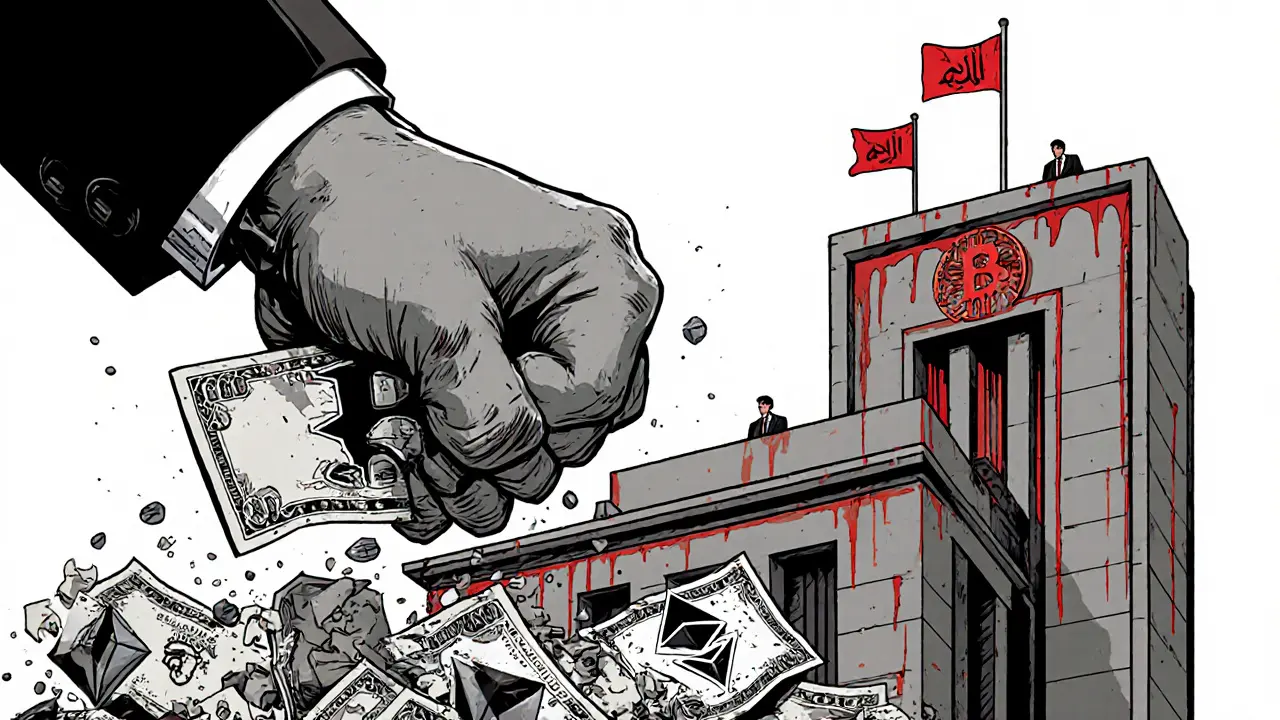Central Bank of Iraq Crypto Restrictions: What You Need to Know in 2025
 Sep, 4 2025
Sep, 4 2025
Iraq Crypto Ban Impact Calculator
Calculate Your Crypto Value in Iraq
Based on Iraq's 2025 crypto restrictions: Official conversion is impossible through banks, but underground markets exist with significant risks. This tool estimates real-world value considering the dinar's depreciation and transaction risks.
Results will appear here after calculation
Important Legal Note: While owning cryptocurrency isn't explicitly illegal, using it for transactions or conversions violates Iraq's anti-money laundering laws. Any conversion through unofficial channels carries significant legal risk.
As of 2025, the Central Bank of Iraq enforces one of the strictest cryptocurrency bans in the world. Unlike countries that regulate Bitcoin and Ethereum with licensing rules or tax frameworks, Iraq doesn’t just discourage crypto-it makes it illegal for any bank, payment processor, or financial institution to touch it. Even holding crypto isn’t explicitly criminalized for individuals, but using it can still land you in legal trouble under anti-money laundering laws. This isn’t just a policy-it’s a system built on fear, control, and deep economic insecurity.
How the Ban Works
The legal backbone of Iraq’s crypto ban is CBI Circular No. (125/5/9), issued in November 2021. It doesn’t just say "don’t trade crypto." It says: virtual assets have no legal status in Iraq. That means if someone sends you Bitcoin and then refuses to pay you back in dinars, you have zero legal recourse. The same goes for any contract, loan, or sale tied to crypto. The Central Bank of Iraq made it clear: only the Iraqi dinar counts as money. This rule applies to everyone in the formal financial system. Banks can’t hold crypto wallets. Payment apps like PayPal or local e-wallets can’t process crypto transfers. Credit cards issued by Iraqi banks are blocked from buying Bitcoin on exchanges. Even foreign crypto platforms that try to serve Iraqi customers face pressure from the CBI to cut them off. In March 2022, the bank doubled down with a directive tied to the Financial Action Task Force (FATF) guidelines. That meant banks had to overhaul their internal systems to detect any crypto-related activity-even indirect links-and report them. The goal wasn’t just to stop crime; it was to make compliance so expensive and risky that no institution would even try to work with crypto.Why Iraq Banned Crypto
The official reasons sound familiar: money laundering, fraud, volatility. But the real story is deeper. Iraq’s economy has been in freefall for years. After the 2020 devaluation of the dinar-from 1,182 to 1,450 per U.S. dollar-prices for food and fuel jumped overnight. People lost trust in their own currency. Many turned to dollars, gold, and yes, crypto, as a way to protect their savings. The Central Bank couldn’t control that. And when citizens start using alternative stores of value, it undermines the state’s ability to manage the economy. If people aren’t depositing money in banks, the government can’t print more dinars to fund its budget. Iraq’s monthly spending needs are between 18 and 20 trillion dinars, but deposits make up only 8.8% of the total money supply. That’s not a banking problem-it’s a collapse of public trust. The ban isn’t about protecting consumers. It’s about maintaining control. Crypto lets people bypass the state’s financial system. And in a country where the government has a history of freezing salaries, cutting public services, and monitoring dissent, that’s unacceptable.Religious Rulings Back the Ban
Iraq’s crypto ban isn’t just legal-it’s moral. In 2018, the Supreme Fatwa Authority of the Kurdistan Regional Government issued a religious ruling against OneCoin, a cryptocurrency later exposed as a massive fraud. The fatwa didn’t just condemn OneCoin-it painted all crypto as haram (forbidden) because it lacks intrinsic value and enables speculation. This wasn’t just a footnote. In a society where religious authority carries weight, this helped turn a financial policy into a cultural norm. You won’t hear this in official press releases, but many Iraqis avoid crypto not because they fear the law, but because their imams told them it’s sinful. That’s a powerful tool for enforcement. No surveillance needed.
People Are Still Using Crypto-Quietly
Despite the ban, crypto isn’t gone. It’s underground. Across Baghdad, Basra, and Erbil, peer-to-peer trades happen in cafes, through WhatsApp, and in cash exchanges. People buy Bitcoin from traders who meet them in person, pay in dinars, and hand over a private key on a USB drive. Some use VPNs to access foreign exchanges. Others buy USDT through informal networks tied to remittance services. The CBI doesn’t arrest individuals for owning crypto. There’s no law that says, "Possession of Bitcoin is a crime." But if you’re caught trading large amounts, you could be accused of violating anti-money laundering rules. That’s a legal gray zone: not illegal to hold, but dangerous to use. This gap between law and reality is intentional. The government wants to scare institutions into compliance, but it can’t stop every person with a smartphone. Enforcement is patchy. Police don’t have the tools. Courts don’t have the expertise. And most officials don’t even understand how crypto works.The CBDC: The Government’s Answer
While banning private crypto, Iraq is racing to launch its own digital currency. In March 2025, Mazhar Mohammed Saleh, financial advisor to the Prime Minister, confirmed the Central Bank is actively developing a Central Bank Digital Currency (CBDC). This isn’t Bitcoin. It’s the opposite. A CBDC gives the government total control. Every transaction is tracked. Every dollar spent can be monitored. The CBI says it wants to reduce cash printing, cut corruption, and improve financial inclusion. But critics see something darker. Human rights groups warn that a state-controlled digital currency could become a tool of oppression. Imagine: your salary is paid in CBDC, but if you donate to a protest group, buy medicine from an unapproved pharmacy, or even post criticism online, your account could be frozen. Iraq already has a record of punishing dissent-arrests, salary cuts, torture. A CBDC makes that easier. Unlike crypto, which is decentralized and anonymous, the CBDC will be centralized and traceable. It’s not innovation-it’s surveillance with a digital stamp.
What This Means for Iraq’s Future
Iraq’s crypto ban and CBDC plan reflect a deeper conflict: between financial freedom and state control. Other countries are trying to regulate crypto to harness its benefits. Iraq is trying to bury it and replace it with something even more controllable. The result? A growing digital divide. The wealthy find ways to access crypto through offshore accounts and trusted intermediaries. The poor are stuck with a devalued dinar and a government-controlled digital currency that tracks their every purchase. Legal experts, like those at Al Nesoor Law Firm, say Iraq needs balance. A total ban doesn’t stop crypto-it just pushes it into the shadows where it’s harder to regulate. And a CBDC without legal safeguards could erode civil liberties faster than any cryptocurrency ever could. For now, the Central Bank of Iraq holds all the power. But as smartphones spread and internet access grows, more Iraqis will find ways to bypass it. The question isn’t whether crypto will survive in Iraq. It’s whether the government will realize that control isn’t the same as stability.Frequently Asked Questions
Is it illegal to own Bitcoin in Iraq?
No, owning Bitcoin or other cryptocurrencies isn’t explicitly illegal for individuals. However, using it to make payments, trade, or exchange for dinars through banks or payment systems is banned. If you’re caught trading large amounts, you could be investigated under anti-money laundering laws, even though there’s no specific crypto crime statute.
Can I use PayPal or other e-wallets to buy crypto in Iraq?
No. Iraqi banks and licensed payment providers are prohibited from processing any transactions involving cryptocurrencies. PayPal, Wise, and local e-wallets like iPay or Sadad have been instructed to block Iraqi users from buying, selling, or holding crypto. Even if you use a foreign account, your Iraqi bank may flag or freeze funds linked to crypto exchanges.
Why is Iraq pushing a CBDC if it bans crypto?
The Central Bank wants the benefits of digital money-lower printing costs, better tracking of spending, and reduced cash leakage-but without losing control. A CBDC lets the government monitor every transaction, freeze accounts, and even set expiration dates on money. Unlike Bitcoin, which is decentralized, the CBDC is fully controlled by the state. It’s not about innovation-it’s about surveillance.
Are there any penalties for banks that violate the crypto ban?
Yes. Banks and financial institutions that violate the ban face heavy fines, license suspension, or revocation. The CBI conducts regular audits and requires banks to submit reports on all digital transactions. In 2023, two local banks were fined over 2 billion dinars each for allowing crypto-linked transfers through third-party payment gateways.
Can I send crypto to someone in Iraq from abroad?
Technically, you can send crypto to a wallet address in Iraq. But if the recipient tries to cash it out through a local exchange, bank, or payment service, they’ll hit a wall. The CBI blocks all institutional access points. The only way to convert crypto to dinars is through informal, unregulated channels-which come with high risk and no legal protection.
Is Iraq the only country banning crypto?
No, but it’s among the strictest. As of 2025, only about ten countries have complete crypto bans, including Egypt, Algeria, Morocco, and Nigeria (though Nigeria’s enforcement has loosened). Iraq stands out because it combines legal bans with religious rulings and is simultaneously building a state-controlled digital currency-making its approach one of the most comprehensive in the world.
Vanshika Bahiya
November 15, 2025 AT 11:39Really well-researched piece. I’ve seen similar patterns in India with digital rupee rollout - the government wants control, not innovation. People still use crypto via P2P, just like in Iraq. The real issue isn’t tech, it’s trust in institutions. When your currency loses value overnight, you don’t ask for permission to survive.
Also, the religious angle is fascinating. Fatwas against crypto in Kurdistan? That’s cultural enforcement at its most potent. No cops needed when your imam says it’s haram.
Albert Melkonian
November 17, 2025 AT 03:22This analysis is exceptionally thorough and demonstrates a nuanced understanding of the intersection between monetary policy, religious authority, and digital sovereignty. The Central Bank of Iraq’s actions are not merely regulatory but represent a systemic effort to preserve institutional legitimacy in the face of collapsing public confidence. The emergence of a CBDC, while technically sophisticated, raises profound ethical questions regarding financial surveillance and the erosion of economic autonomy. One must consider whether the preservation of state control justifies the suppression of individual financial agency, particularly in contexts where traditional institutions have failed their citizens.
Kelly McSwiggan
November 18, 2025 AT 20:25Wow. A 2000-word essay on how Iraq is… not letting people use Bitcoin? Groundbreaking. Next up: ‘The Shocking Truth: North Korea Also Doesn’t Want You Using PayPal.’
Meanwhile, the CBI is out here playing 1984 with a spreadsheet and calling it ‘financial inclusion.’
Also, ‘crypto is haram’? Cool. So is my ex. Doesn’t mean I’m not still texting him at 2am.
Byron Kelleher
November 19, 2025 AT 04:44Man, I get why people are turning to crypto - it’s not about rebellion, it’s about survival. When your paycheck buys less bread than it did last year, you do what you gotta do.
I’ve met guys in Baghdad who trade Bitcoin over chai in cafes. No drama. No drama at all. Just people trying to keep their families fed. The state’s got its CBDC, sure - but that’s not protection, it’s a leash.
Let people breathe. They’re not trying to overthrow the government. They’re just trying not to starve.
Cherbey Gift
November 20, 2025 AT 08:49Ohhhhh sweet celestial chaos - the Central Bank of Iraq is trying to cage lightning with a paper towel and a prayer!
Crypto isn’t just money, it’s rebellion wrapped in a private key, whispered through WhatsApp, passed hand to hand like sacred bread in a broken church.
And now they want to replace it with a digital leash that whispers back to the Ministry of Control? Honey, that’s not progress - that’s a prison with Wi-Fi and a soul-crushing UI.
Meanwhile, the imams are busy writing fatwas like they’re TikTok influencers - ‘Don’t touch the crypto, it’s a demon with a blockchain beard!’
But guess what? The demon’s still trading. And he’s got better ROI than your pension fund.
Control is a myth. The people are already free. You just haven’t noticed because you’re still looking for the bank.
Anthony Forsythe
November 22, 2025 AT 02:22Let me tell you something - this isn’t about crypto. This is about the slow, agonizing death of a nation’s soul.
The Iraqi dinar isn’t just losing value - it’s losing meaning. It’s no longer a symbol of economic stability - it’s a relic of broken promises, of salaries that vanish like smoke, of children who don’t know what a stable price for rice is.
And so the people turn to Bitcoin - not because they’re tech bros, not because they’re anarchists - but because it’s the only thing left that doesn’t lie.
The CBDC? Oh, the CBDC is the final betrayal. A digital ghost that watches you buy milk, tracks your pharmacy visits, freezes your account if you dare to speak truth to power.
They don’t want to ban crypto because it’s dangerous.
They want to ban it because it’s honest.
And honesty? Honesty is the most dangerous thing of all.
Kandice Dondona
November 22, 2025 AT 14:52THIS. IS. SO. IMPORTANT. 💔
People are just trying to survive and the government’s like ‘nah, here’s a digital ID that knows when you bought onions’ 😭
Also the fatwa angle? Mind blown. 🤯 Imams as financial regulators??
So proud of the underground crypto traders - real-life heroes with USB drives and WhatsApp groups 🙌
CBDC = surveillance with a fancy logo. No thanks. I’ll take my Bitcoin and my peace of mind any day. 🙏❤️
Becky Shea Cafouros
November 23, 2025 AT 04:14The article is well-structured and factually accurate. However, the framing leans heavily into ideological interpretation rather than policy analysis. The Central Bank’s position is not inherently oppressive - it is a response to systemic financial instability and international regulatory pressure. While the CBDC may raise privacy concerns, it is not inherently a tool of authoritarianism. Many developed nations are pursuing similar initiatives with legal safeguards. The narrative of ‘control vs. freedom’ oversimplifies a complex macroeconomic challenge.
Drew Monrad
November 24, 2025 AT 12:21Oh so now the government is the bad guy? Please. The real villain here is the IMF. They’ve been squeezing Iraq for decades. Now the CBI bans crypto? Big deal. They banned water if it wasn’t approved by the Ministry of Dinar.
And CBDC? LOL. You think the U.S. doesn’t have a digital dollar in the works? You think the EU isn’t watching every euro? You’re not special. You’re just mad because your cousin in Basra can’t buy Dogecoin without a visa.
Wake up. The whole world is surveilling you. Iraq just has worse Wi-Fi.
Cody Leach
November 26, 2025 AT 11:52Appreciate the depth here. The real story isn’t the ban - it’s the quiet resilience of ordinary people finding ways to keep their families afloat. The CBI’s fear isn’t about crypto. It’s about losing the last thread of economic power. But you can’t stop people from seeking stability - you can only make them do it in the dark. That’s not policy. That’s panic.
sandeep honey
November 27, 2025 AT 12:15India has the same problem. RBI hates crypto but people trade it anyway. The difference? We have WhatsApp groups with 10k members. Iraq’s got USB drives. Same energy. Different tech.
CBDC is just a state-backed scam. They’ll call it ‘secure’ but it’s just another way to tax you into oblivion.
Also - why are they not arresting people? Because they know they can’t win. The people already won. They just haven’t told the government yet.
Mandy Hunt
November 27, 2025 AT 15:32CBDC is the devil’s credit card the government is feeding you while they watch your every coffee purchase
they want you to think crypto is dangerous but the real danger is trusting them with your money
they’ve been lying since 2003 and now they want to track your toilet paper
they’re not protecting you they’re preparing for the next revolution
your phone is already a spy
they’ll freeze your account if you buy medicine for your sick kid
they’ve already killed people for less
you think this is about money
it’s about control
and they’re winning
anthony silva
November 29, 2025 AT 08:11So the bank bans crypto but lets people use it? Cool. So it’s illegal but also not illegal? Sounds like my ex’s text messages
and the CBDC? Oh so now we’re all gonna have digital shackles? Sweet
also the fatwa thing? Yeah because nothing says ‘divine wisdom’ like a bunch of dudes in robes banning tech they don’t understand
also why are you writing a novel about this
it’s just money
stop being dramatic